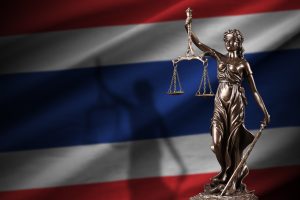Calls are mounting for Thailand’s government to take assertive action to ensure justice for those accused of involvement in the 2004 Tak Bai massacre, in which 85 Malay Muslim protesters were killed in southern Thailand.
In August, the Narathiwat Provincial Court in southern Thailand agreed to accept a complaint filed by the families of 48 of the victims from Tak Bai, after years of legal efforts. The complaint seeks to prosecute seven officials, including former high-ranking military personnel and police officers, for their role in the massacre. Last month, the Thai Attorney General’s Office also announced the opening of a second case into the massacre, this one involving eight defendants.
However, the 20-year statute of limitations on the killings is set to expire at midnight tomorrow, and none of the defendants, all former or current high-ranking officials, have so far shown up to court in Narathiwat. Unless at least one does so by tomorrow, the case will be dismissed – and a rare chance at justice will be lost.
On Monday, the Bangkok Post reported, 43 civil society organizations signed an open letter urging Prime Minister Paetongtarn Shinawatra, along with the interior minister and national police chief, to make sure the seven defendants in the case are brought to trial before the deadline.
In a statement the following day, the human rights group Amnesty International called for the government to take urgent action to apprehend the defendants, some of whom it alleged are out of the country. “The Thai authorities must take all necessary steps to ensure there is no impunity for those suspected of criminal responsibility for grave human rights violations in this case,” Amnesty’s Thailand Researcher Chanatip Tatiyakaroonwong said in the statement.
The Tak Bai massacre is one of the deadliest incidents to have taken place during the conflict in southern Thailand, where Malay Muslim organizations have been fighting for autonomy from the Thai state since the middle of last century.
The killings took place on October 25, 2004, when a group of 2,000 protesters assembled outside the police station in Tak Bai, a town in Narathiwat province. The protesters were demanding the release of six Malay Muslims who had been arbitrarily detained by Thai security forces on suspicion of providing firearms to local separatist insurgent groups.
In the ensuing crackdown, seven protesters were killed by gunfire and around 1,370 Malay Muslim men were detained. Of these, 78 were suffocated or crushed to death after they were stacked on top of each other in army trucks before being transported to a military camp in Pattani province, some 150 kilometers away.
The Tak Bai massacre took place nine months after the institution of martial law in Pattani, Yala, and Narathiwat provinces, in response to an upsurge of separatist attacks. The conflict in southern Thailand has since killed more than 7,600 people.
The incident has since come to stand a symbol of the impunity enjoyed by the Thai security forces. The fact that the two cases have been initiated so close to the expiry of the statute of limitations, giving defendants the opportunity to lay low until after the deadline, only underlines the point. It is no surprise that when the seven defendants were summoned to court on September 12, none showed up. Two of those charged, including General Pisan Wattanawongkiri, the former 4th Army Commander and until recently a member of parliament for the ruling Pheu Thai party, have reportedly fled abroad.
For their own part, government officials say they are doing their best to track down these suspects and bring them to trial.
The likelihood that the case will be dismissed has prompted some to call for the government to take more radical steps. Prinya Thaewanarumitkul, a law lecturer at Thammasat University, argued this week that the government could potentially issue an executive decree to extend the statute of limitations. The National Human Rights Commission has also urged the government to pass a legal amendment that would remove the statute of limitations for any future cases involving serious human rights violations committed by state officials. Amnesty International also expressed the view that there “should be no statute of limitation for serious human rights violations or crimes under international law, including extrajudicial killings and torture.”
Attention also turns to the question of how the dismissal could impact the broader trajectory of the conflict in the Deep South. In an article this week for Fulcrum, Paul Chambers, a lecturer at Naresuan University, said that failure of the case could unravel the progress that has been made in southern Thailand since the current Pheu Thai government took office in September 2023. Since then, the government has introduced a number of reforms to its southern policy in a bid to make it “more beholden to the people.” This period has also seen increased dialogue with the Barisan Revolusi Nasional, the largest insurgent group in the Deep South, which together with the Thai government earlier this year established a framework for a Joint Comprehensive Plan towards Peace (JCPP).
However, Chambers argued that the government’s efforts “have been and would continue to be compromised by persistent military resistance and unresolved grievances over cases like Tak Bai.” If the government fails to arraign, let alone convict, those accused of the massacre, he wrote that the policy implications could be “significant.”
“There could well be an end to the JCPP process, a breakdown in conflict resolution, and even an upswing in violence,” Chambers warned.

































